They were close to throwing away a three goal lead, but came good in the end. It was an emotional rollercoaster, but Swansea are now the first Welsh side to grace the Premier League. Well done.





They were close to throwing away a three goal lead, but came good in the end. It was an emotional rollercoaster, but Swansea are now the first Welsh side to grace the Premier League. Well done.





Thanks to Catalonia Direct, I've just seen a documentary on Spain's relationship with Catalunya. It's well worth watching, including interviews with some big hitters.
Although it's only just been put online, it appears to have been made early in 2010, for the referendum in Arenys de Munt was in September 2009. Since then there have been several more rounds of these unofficial referendums the length and breadth of Catalunya, with the biggest in Barcelona in April this year. I wrote about it here.
Some people will also recognize Matthew Tree, an Englishman who has lived in Catalunya for over twenty five years. I've already featured an essay and a talk he's given about his impressions of the strained relationship between Catalunya and Spain, particularly in terms of differing attitudes and identities:
Life on the Receiving End
Catalunya: The Future is Another Country
Plaid Wrecsam beat me to it with the video, but it's worth showing again.
You seem to have made a real success of this independence thing. Well done,
and thanks ...... thanks for showing us how to do it.
Well, that was a slightly paraphrased ending. I was going to say, thanks for giving us the idea, but I think it was probably the other way round.
-
As we can read in this article from the Harvard Gazette, Adam was chosen to give this year's Graduate Oration. Perhaps he, and we, should be grateful that he wasn't chosen to give the Latin Oration.
Adam Price, Graduate Oration
Harvard Kennedy School (HKS) student Adam Price is a seasoned public speaker. But one thing will be different when he stands to give this year’s graduate oration: He’ll have receptive listeners.
“I’m very used to being heckled,” said Price, a former British member of Parliament who served two terms with the Welsh nationalist party Plaid Cymru. “I was a member of a party of three, so I didn’t have many friends in the audience.”
He’ll talk about the importance of independent thinking, something Price, 42, values highly. The son of a coal miner, he went into politics to fight for his homeland of Wales, which never recovered economically from the decline of the steel and coal industries.
“It’s a rare and cherished thing in politics to be able to represent the people you went to school with,” he said.
Price made bigger waves in 2004 when he led the charge to impeach then-Prime Minister Tony Blair for leading Britain into the Iraq War under false pretenses. He surprised observers by announcing he wouldn’t run again in 2010, choosing to leave his almost-guaranteed seat in Parliament for HKS’s Mid-Career Master in Public Administration program.
“We [in Wales] would like to take a leaf out of America’s book and assert our own right to self-determination,” he said. “Half the reason I came here was to learn how you did it.”
Price plans to stay in Cambridge for another year to complete a fellowship at HKS’s Center for International Development, where he will study the economic plight of small nations. He hopes to apply that knowledge when he returns to Wales.
“I’d like to be a bridge between these incredible, exciting new ideas being generated here and the world,” he said.
For those who were speculating about his early return, it looks like he'll be staying in Harvard for another year.
The Vale of Glamorgan Council has refused to allow the new Welsh-medium starter school in Barry to name itself after Gwynfor Evans. Apparently this is considered "too political".
Gwynfor Evans new school name in Barry 'too political' – BBC, 25 May 2011
There has obviously been some misunderstanding. As anyone in Plaid Cymru will tell you, Gwynfor wasn't a politician ... he was a saint.
Two other WM primaries—Ysgol Sant Curig and Ysgol Sant Baruc—are named after local saints, so it is hard to see why the new school shouldn't follow this tradition and be called Ysgol Sant Gwynfor.
Following on from my previous post, I thought it would be a good idea to add some reports from other sources. The best graphics of the result I can find are from Gara. This is the overall result with the 2007 figures below. Click the image for a larger version.
The overall figures don't match the other reports. As far as I can work out, this is because they have included the results for Navarre, which any Basque nationalist worth their salt regards as a part of the Euskal Herria, even though it is not part of the Basque Autonomous Community. The equivalent of the EAJ-PNV there is Nafarroa Bai (NaBai on the graphics). This is the breakdown for the four provinces.
And here are a couple of press reports in English, from the perspective of Madrid:
Far exceeding expectations, Bildu came second in Sunday's polls with just over one quarter of the total, behind the Basque Nationalist Party's 30 percent but well ahead of the Socialists' 16 percent, results showed.
In the region's second largest city San Sebastian, it even took the most votes, winning eight seats to seven for the Socialists -- who have held power there since 1991 -- and six each for the moderate Basque Nationalist Party and Spain's main conservative opposition Popular Party.
Bildu "has redesigned the electoral map of the Basque Country after the best results ever obtained for the radical left", Spain's leading daily El Pais said.
"The explosion of Bildu", headlined the centre-right daily El Mundo. "In addition to the many reasons that the Spanish have to be outraged, there is now another that is extremely worrying", it said in an editorial, warning that Spain could "face a huge political problem" in the region.
An editorial Spain's conservative daily ABC said the "radicalisation of Basque politics is the worst news from these elections and could have damaging consequences."
Until now, Basque separatists had seemed to become increasingly marginalized in the troubled northern Spanish region's political life. But the surprise victory of the radical separatist alliance Bildu in Sunday's local elections revealed separatism as a growing force.
The radicals took no less than 953 councillors, the largest number in the region. Bildu netted 25 per cent of the Basque vote, coming second only to the more moderate Basque Nationalist Party (PNV), which took 30 per cent. Separatists had never had as much support, the radical Basque daily Gara rejoiced, hailing a 'new political era'.
But spirits were gloomy in Madrid, where the conservative daily El Mundo saw Bildu's rise as eventually spelling a 'huge political problem' for Spain ...
Prior to the ban, Batasuna had taken about 12 per cent of the Basque vote. Bildu's score of 25 per cent was seen as a sign that a new non-violent separatist movement was gaining momentum in the region ...
The PNV and Bildu now constituted 'a clear separatist majority' in Basque municipal councils, El Mundo said, describing the situation as being 'extremely worrying' for Spain.
I trust the language used goes some way towards explaining how big a political shift has taken place, and how concerned those who want to hold Spain together are about it.
![]()
Update - 25 May 2011
The full, official results for the municipal elections in the three provinces of the Basque Autonomous Community are here. I've shown two key graphics from it, click the images to open larger versions. The first is the number of seats won, showing how Bildu and the EAJ-PNV now dominate the municipalities. Besteak/Otros are independents.
The second shows the percentage of the vote compared with the previous elections in 2007.
In this post back in February I wrote about Sortu, an attempt to build a new political group in Euskadi that was unequivocally nationalist, but on the left of the political spectrum.
As expected, the Spanish State immediately ruled that this group was illegal, even though the party's constitution specifically rejected violence and committed itself to securing Basque independence by peaceful, democratic means only. Yet there was a Plan B, and immediately following that decision another broad left pro-independence group was formed – this time centred on Eusko Alkartasuna, Alternatiba, Araba Bai (a split of Aralar) and some independents – called Bildu.

Eusko Alkartasuna and Aralar are long standing parties which the Spanish State have not banned, and indeed EA are Plaid Cymru's partners in the EFA group in the European Parliament.
Of course the Spanish State immediately banned Bildu as well, but this proved to be the straw that finally broke the camel's back. As we can read here, the centre-right Basque nationalist party, the EAJ-PNV, withdrew its support from the minority Spanish government at the beginning of March in protest at the decision. Then, as if to prove to the world that all these decisions to ban left wing nationalist political groups have been taken for political rather than judicial or constitutional reasons, the Constitutional Tribunal promptly overruled the Supreme Court decision at the beginning of this month, as we can read here.
-
What was at stake was the ability of the pro-independence left to field candidates in the municipal elections which took place yesterday. The result was astounding. Bildu swept in to become the largest party in terms of seats, and second largest in terms of votes.
The newly-formed Basque nationalist coalition gained second place in the election race being the second party with most votes and the first party with most seats
A newly-formed Basque nationalist coalition called Bildu became the political party with most seats and second in number of votes in local and regional elections in the Basque Country.
Bildu also won seats in the town halls of three of the region's provincial capitals. The new Basque coalition won 907 seats and 25 percent of the vote. Basque nationalist party PNV gained second place in the election race with 822 seats, but a greater percentage of the vote, 29.9 percent.
The centre-right nationalists, the EAJ-PNV, were second in terms of seats won but still ahead in terms of the percentage of the vote; but this result means that there are now two large pro-independence parties with just short of 55% of the vote between them, with other smaller pro-independence parties picking up some votes and seats too.
The losers in this election were the Basque socialist PSE-EE, essentially just a regional branch of the Spanish socialist PSOE, committed to keeping Euskadi as part of Spain.

This is very significant for those who want to see Euskadi become independent, for it shows that left-leaning voters are now prepared to make a wholesale shift from the pro-Spanish left to the pro-independence left. In this sense the pro-independence left can finally be said to have got its act together to become a major, unified force in Basque politics, rather than a loose collection of different factions that fought amongst themselves, thereby allowing the PSE-EE to be the main political force on the left.
The nature of politics in Spain means that the municipal election results have a very significant effect on funding. This means that Bildu are now in a very strong position to mount an effective campaign for the elections to the Basque Parliament in a couple of years time. Having achieved this level of support—and, to put it bluntly, the respectability that goes with it—we might well see the PSE-EE completely crumble as the main party of the left, leaving Basque politics as a left-right contest between pro-independence parties.
I'd be willing to bet that a comfortable majority of deputies in the next Basque Parliament will have been elected on a pro-independence mandate, and that the Spanish will not be able to stop them achieving the independence they have wanted for so long.
In the old days, wind turbines used to look like this. These turbines in the Tehachapi Pass windfarm in California were only built in the 80s.
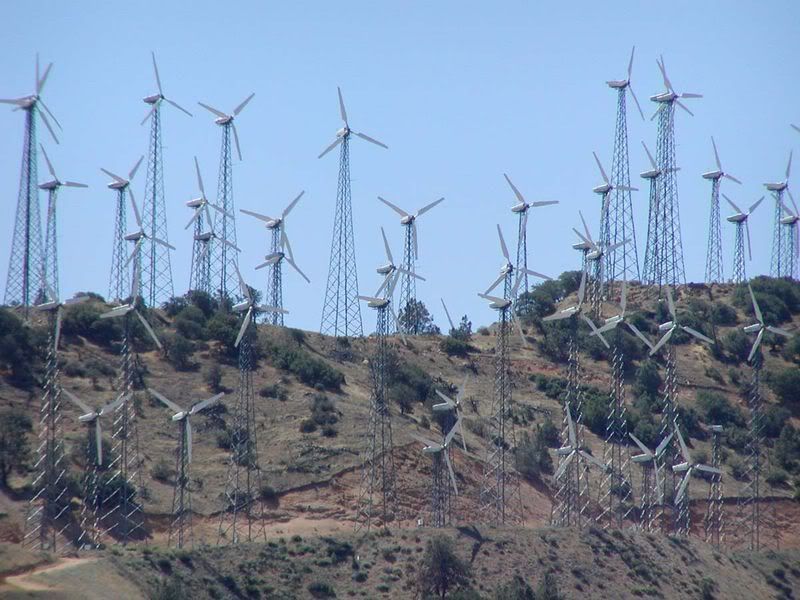
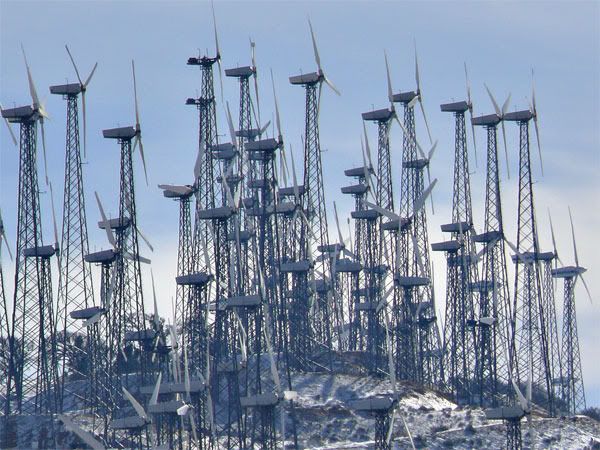
Even those who don't like the look of modern wind turbines would have to say that what we have now is a vast improvement on the earlier versions.
-
So it is interesting to read that moves are being made to change another design anachronism, the pylons that carry overhead cables. The RIBA is launching a competition for alternative designs, following the example of Iceland.
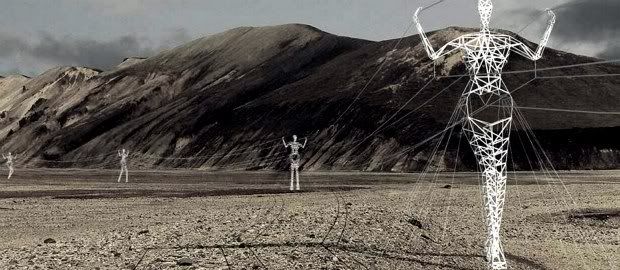
I don't think it's quite fair to say that Iceland uses these anthropomorphic pylons, they are a conceptual design. And, as we can see from the number of stay cables required to hold the pylons up, it's not a particularly well-conceived solution from a structural point of view. But they are a lot of fun and I particularly like this image:
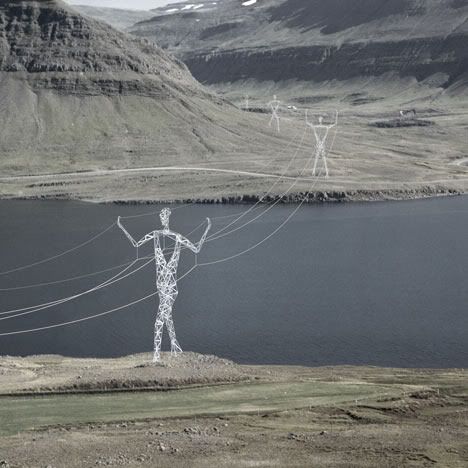
Another weird but wonderful entry was from Arphenotype:
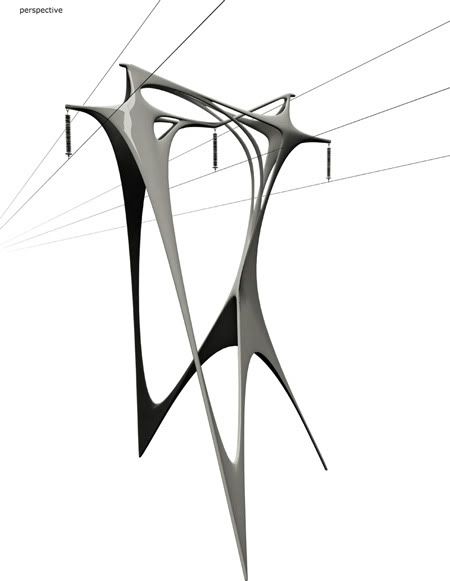
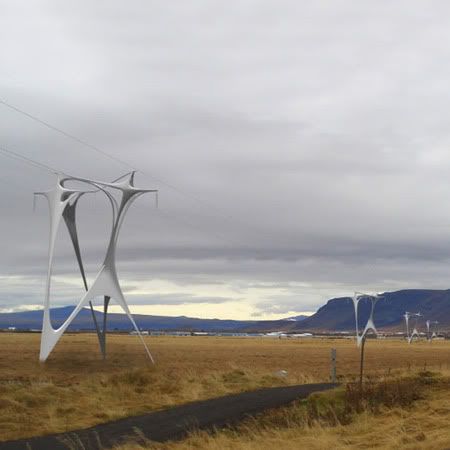
I'm sure the RIBA competition will produce some equally idiosyncratic designs. But for me, the sort of alternative design that would work best is one of elegant simplicity.
-
This design called Dancing with Nature by Hugh Dutton Associés for the Italian energy company Terna fits that description perfectly, and explains the title of this post.
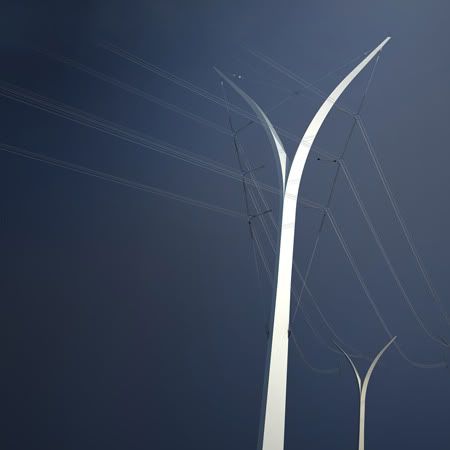

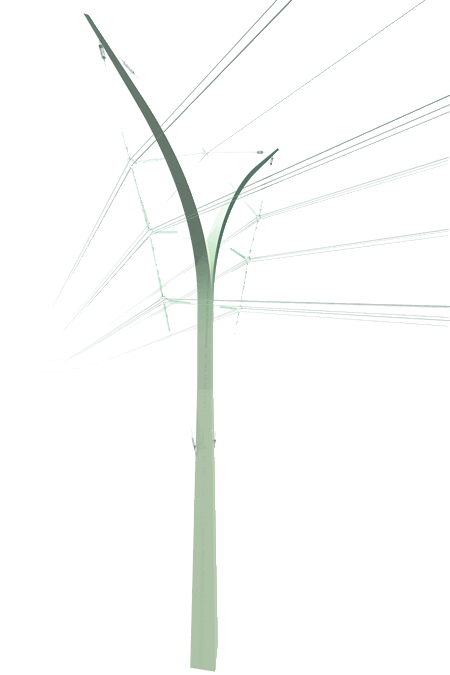
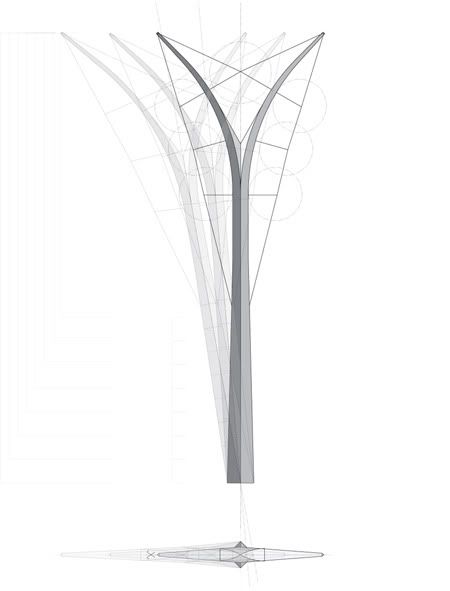
Even the technical detail is fascinating ... well, at least to me. Clicking the images will open a larger version.
Whatever arguments there might be over where to put power lines and whether or not they should be underground, we would do well to ensure that all future pylons are more like this, rather than keep putting up latticework pylons that have hardly changed since the 20s. As with the design of wind turbines, it's time for us to insist on pylons that might grace rather than spoil our landscape.
I suppose it is a bit of an indulgence on my part, but I must admit to being fascinated by the issues in this case. One thing that I've just looked at in more detail is the wording of the relevant legislation itself and, so far as I can see, there is nothing in the wording of the legislation that prohibits a someone from standing as a candidate if they are a member of one of the prohibited organizations.
Section 7 of the GoWA 2006 deals with who can stand as a candidate for election to be an AM, but says nothing about membership of a prohibited organization being an impediment to standing.
Section 16 of the GoWA 2006 deals with disqualification. However it specifically says "a person is disqualified from being an Assembly member if ... " It does not say that any such person may not stand for election, but Section 18 then makes it clear that their return would be void unless the Assembly resolves to disregard the disqualification as provided for in Section 17.
This is actually quite crucial. For although it is true that candidates were asked in the Consent to Nomination Form to declare that they were "not disqualified for membership of the Assembly" there appears to be no legal basis for them to be required to make such a statement. If so, the Electoral Commission has misinterpreted the law (although perhaps with the best of intentions) and John Dixon and Aled Roberts would be able to argue that they had not committed the offence of making a false declaration, because they were not legally required to make a declaration on that issue. They were only legally required to make a declaration about the matters contained in Section 7 of the GoWA 2006, namely that they were not standing for election in more than one region, nor on more than one party list, nor for a constituency.
This would mean that the pair cannot have committed any offence in law. The most that they can be accused of is potentially wasting their own time and effort in standing for election.
-
However, even if there is now no case of wrongdoing to answer, their return as elected AMs is void because they were members of the prohibited organizations when elected ... unless, of course, the Assembly chooses to vote to disregard the disqualification. This has always been the central issue.
-
As I was doing some research on this, I came across an interesting story which goes a long way to explain why it was Sir John Bufton of UKIP that was so anxious to complain that the two had committed electoral fraud. As we can read here, two potential UKIP candidates for the English local elections in Lichfield this month were disqualified from standing on the flimsiest of pretexts. In one case, the reason given was that they had missed the letter Y from the end of the word Party on their nomination forms, even though the forms had been checked and accepted when handed in.
I have very little time for UKIP as a political party, but this strikes me as petty officialdom at its very worst. No candidate should be disqualified on such trivial technicalities. It was grossly and obviously unfair on them, and I'm sure that this is why UKIP now want other parties to suffer the same severe treatment. But an eye for an eye makes everybody blind.
I thought it might be a good idea to say a little more on this subject in addition to what I wrote yesterday. In my last post I considered the matter from the perspective of what the Assembly could do to resolve the issue; but the other, overlapping, issue is whether the pair have committed an offence by reason of making a false declaration on their nomination papers.
As with many tricky problems, the solution often involves drawing a precise line between two issues and treating them separately.
What the Assembly can do
As things stand, John Dixon and Aled Roberts are disqualified from being AMs. However the GoWA 2006 makes provision for this disqualification to be disregarded:
The Assembly may resolve that the disqualification of any person who was, or is alleged to have been, disqualified from being a member on a ground within section 16 (1) or (4) is to be disregarded if it appears to the Assembly –
(a) that the ground has been removed, and
(b) that it is proper so to resolve
What the Police and CPS can do
Every list candidate in the Assembly election was required to sign this declaration:
I ... of ... hereby consent to my nomination as a candidate at the above-mentioned Election. I am aware of the provisions of sections 16-19 of the 2006 Act (disqualification) and of any Order in Council under section 12(1)(b) of the 1998 Act or 16(1)(b) of the 2006 Act and that to the best of my knowledge and belief I am not disqualified for membership of the Assembly. I am not an individual candidate or a candidate on any other party list in the election for this or any other region; nor a candidate at a constituency election, the poll for which is to be held on Thursday 5 May 2011.
It is now clear that both Dixon and Roberts made false declarations, and it is therefore proper for the police to investigate this and for the pair to face prosecution because of it. I am fairly sure that this was an oversight or carelessness on their part, and they will of course be free to say that in their defence. Nevertheless I think it is almost inevitable that they will be found guilty, although my guess is that the appropriate punishment will be no more than a substantial fine.
-
It is therefore possible for the Assembly to disregard their disqualification, allowing them to become AMs, but for them also to be punished by the Courts for making a false declaration. The two are not directly linked.
Of course there will be a tendency for politicians to sit back and wait for the police and Crown Prosecution Service to come to a decision ... and, if they decide to proceed with a prosecution, for the trial to take place. Yet that would take several weeks, if not months. The Assembly really needs to make a decision within the next week or so for the sake of the people that these two were elected to represent. This must always be the primary consideration.
Although it might at first sight seem that the Assembly is "preempting" a decision to prosecute, the key is to keep the issue of the disqualification separate from the false declaration. It is not for the Assembly to decide their punishment for false declaration, it can only decide whether to disregard the disqualification and allow them to become AMs. If the Assembly does not allow them to become AMs, then the Assembly has no power to disipline them. The Assembly should not play a game of cat and mouse by letting the matter drag on for weeks.
If—as I think it should—the Assembly allows them to become AMs, then any prosecution can still proceed in the usual way and the appropriate punishment for any offence of false declaration will then be decided by the Courts rather than by the Assembly. Although I think it very unlikely, the Courts might decide they should not be AMs; but that will be, and will be seen to be, an impartial legal decision. Any decision taken by the Assembly will be, and will be seen to be, a decision based on politics rather than impartiality.
What should happen in the longer term
It strikes me that this is a particularly badly conceived section of legislation, and that it should be amended to allow people to resign their membership of the prohibited organizations after they are elected, but before they are sworn in as AMs.
The matter of the disqualification of John Dixon and Aled Roberts from becoming AMs is of course very embarrassing to them and to the LibDems. There is no excuse for them not knowing the rules.
Yet it does appear to me that there is a clear and obvious way to resolve the difficulty, set out in the very same legislation as they have both fallen foul of. Section 17 (3) of the GoWA 2006 says:
The Assembly may resolve that the disqualification of any person who was, or is alleged to have been, disqualified from being a member on a ground within section 16 (1) or (4) is to be disregarded if it appears to the Assembly –
(a) that the ground has been removed, and
(b) that it is proper so to resolve
I do not see what the point of including this section would be unless the Act envisaged that the rules were complicated enough for people to fall foul of them.
The grounds for disqualification have now been removed by their resignation from the listed organizations, so it is now simply a question of whether the Assembly thinks it proper to allow them to be AMs. My advice is that the Assembly should allow them to.
-
We need to be clear that John Dixon and Aled Roberts are entirely at the mercy of the Assembly. But because the matter was clearly an oversight rather than in any way deliberate, I think it is entirely appropriate to show them that mercy.
However to my mind the more important question to ask is what would be achieved by banning them. As they were both returned on the regional lists rather than in constituencies, they would simply be replaced by the two people second on the LibDem lists: Eluned Parrot and Eleanor Burnham. There won't be a re-run of the election, so from a party political perspective there is nothing to be gained; two LibDems will simply be replaced by two other LibDems.
Yet if one of the most frequently heard complaints about the Assembly is the quality of the AMs that are elected to it, then in a practical sense it is surely better that the Assembly has those who the LibDems put at the top of their regional lists for South Wales Central and North Wales, rather than those who the LibDems put second.
Of course I can see the narrow political advantage to be gained from making sure that your political opponents in the Assembly are second rate, but what does this do for the reputation of the Assembly itself? Surely a mature national institution and a confident government should not be afraid of facing the best that one of its opposition parties has to offer, rather than send the signal that they prefer only to face scrutiny from the second best.
Sir Gâr is an exasperating council, particularly when it comes to Welsh-medium education. They seem absolutely determined to make a pig's ear secondary school reorganization, as was in the news again today. But it was a story about another school that caught my eye:
Our school's been lost in translation – Llanelli Star, 18 May 2011
Ysgol y Felin is a dual stream school in Felinfoel, on the outskirts of Llanelli. It seems that the LEA have just taken the decision that the intake this coming September will be entirely Welsh-medium, although children already in the English-medium stream will continue to be taught in English for the remainder of their time there. In seven years, the school will be entirely Welsh-medium.
This should not cause any real problems for any parents who want their children to have an English-medium in the area, for there are two other schools very close by. Dafen School is only 600m away in one direction, and Swiss Valley School only 1.2km away in the other direction.
As it happens, this local authority did exactly the same thing a couple of years ago in Trimsaran, as I mentioned in this post at the time. It's a very good way of increasing WM provision without having to go through the trauma of closing EM schools and then re-opening them as WM schools. No child's education is disrupted in any way, and the local community does not lose a valuable resource.
-
But although the decision is good, the way it has been handled is most definitely not the way any council should do things. Reading the story in the Star, it would appear that this is an out of the blue decision, but in fact it has been on the cards for some years. If we read this document from 2009, we can see that redesignating the school was one of the options available.
There is nothing that I can find on the council's website to either announce or explain the decision. Even the headteacher hasn't been told all the details. But I think it's safe to guess that the council suddenly realized it had a problem when admission applications were received in February, because they again showed that the demand for WM education was much greater than they had planned for. This has been the case for the last few years, but the options for simply adding more additional temporary accommodation have run out.
They have already planned to increase the size of the new Ysgol Ffwrnais from 1FE to 2FE, and a new 1FE Ysgol Brynsierfel is also due to open this coming September. This should give people some idea of how quickly the demand for WM places is rising.
It seems obvious to me that the Labour/Independent council could and should have been much more proactive in increasing WM provision in and around Llanelli. But they keep failing to do so and therefore find themselves having to react at very short notice. This is not good for anybody concerned.
I've just enjoyed watching a programme on Alex Salmond by Michael Portillo, and I'd like to recommend it to others.
It was only shown on BBC Scotland; but there's a taster here, and the full programme is here on iPlayer until Sunday.
![]()
Update - 22 May 2011
The programme is no longer on iPlayer, but it's so good that I've taken the liberty of embedding it here:
I wasn't particularly pleased with Ieuan Wyn Jones' announcement that he would step down as Plaid leader sometime in the next two or three years, though it was obviously better than saying he would step down immediately. I don't think anyone inside or outside the party expected him to be leader at the time of the next scheduled elections to either Westminster in 2015 or the Senedd in 2016, so what on earth possessed him to say what he did now?
There is of course a precedent for announcing that you are going to stand down not now, but in a few years' time. Rhodri Morgan announced that he would step down as leader of the Labour group in the Assembly a full four years before he actually went. But one factor that enabled him to do this was the discipline within the Labour party. He knew that the contenders for the leadership would not make any public moves until he was ready to go.
I've no doubt that Ieuan was trying to do the same thing: he hoped that by confirming that he would step down in two or three years, he would carve out time and space for Plaid to properly consider both our own direction as a party, and time and space for a greater range of potential leaders to prove themselves, particularly our newly elected AMs.
But sadly not all our AMs have the same discipline as was shown by the Labour party.
-
In an interview last December, Dafydd Elis Thomas said that he would like to "do a lot of damage" if he was no longer Llywydd after the elction in May. He appears to have started already, with his first target being Plaid Cymru.
He obviously wants to be leader of the party, and I suppose there is a slim chance that he could be leader ... but only if he is able to "bounce" the party into an election contest in the next few weeks or months. Yet what sort of leader could he be? The best he could hope to be is a caretaker, in the same way as Menzies Campbell became temporary leader of the LibDems when Charlie Kennedy had to admit his drink problem.
I've no doubt that Dafydd El's ego thinks he has enough stature to hold the job for a year or two, but does he have any idea where the party is going? Over the past years I have come to regard him as at best a semi-detached member of Plaid; someone who does not seem to have taken any interest in the policies of the party, preferring the status first of the House of Lords and then of Llywydd. It was a standing joke that he saw himself as the first President of Wales rather than the first Presiding Officer of the Assembly. And he certainly seemed quite at home mixing with what we might call "the establishment" ... though we were more than happy to let him. It was a dirty job, but someone had to do it.
I very much doubt that anyone can make the transition back to an active or meaningful political role after having been in a non-party political role for the last twelve years. It would be equivalent to a Speaker of the Commons thinking they could return to the back benches. Retired or ousted Speakers all went to the Lords, and I think semi-retirement in the House of Lords might be the best place left for him.
-
I think we in Plaid are faced with two choices of action. The first is to spend the next two years or so to regroup and set out a road map of how Wales is going to gain more autonomy and become independent. The second is to think that being in power now matters more than Wales' long term future.
Dafydd El is holding out a carrot, hinting that Plaid can be back in government with the Labour party by the end of the year. Is that really the scope of our ambition for Wales? We went into One Wales in 2007 primarily because of one thing: the referendum on lawmaking powers for the Assembly, which could only have happened with the support of Labour because it required two-thirds of AMs to approve it. We negotiated other good things into the agreement too, and got the experience of being in government for the first time ever, but in my opinion those things were secondary. As I said in this post last week, the only basis on which we should consider doing another deal with Labour is if it results in more areas of responsibility being devolved to Wales.
Being in government with Labour is completely meaningless unless it is accompanied by a firm programme of further devolution to Wales. Those are the carrots that matter, and only a moron would think one or two ministerial posts could be a substitute for them.
-
What I fear is a stitch up by elements within Plaid that are more interested in getting power for themselves or their protégés than in the direction we need to take as a party. We should be a bottom-up, not a top-down party. If we want to be run by a small elite, we might as well give up and join Labour or the Tories. It's all too easy to present a quick change at the top as a cure for past failures, and it's all too easy for people at the top to think that doing a quick internal review will make Plaid more electable. Something much more radical is needed.
We need to involve the whole party in this, and involve people that could and would support Plaid if we were to adopt a more far-reaching set of ambitions for Wales. This means that the debate must spill out into the open rather than be something that can be handled behind closed doors. My advice is that we should not be afraid of that, even though it means that the next couple of years are not going to be easy for us.
-
Everything depends on what we're trying to achieve. If we're looking to point fingers at people for either doing or not doing things, or indeed for their characters and personalities, then it would be better to do it in private. But I think we'd do a lot better if we took collective responsibility for not capturing the imagination of people in Wales, rather than simply pass responsibility to the next set of shoulders in the hope that they might have the magic missing ingredient. We're too concerned with personality and not concerned enough about policy. I've lost count of the number of people whose only answer to what we should now do as a party is either, "We should never have got rid of Dafydd Wigley" or "Adam Price will sort everything out" ... with the subtext that we're stuffed unless he can take us in hand and lead us forward.
In a way, we've been living with the legacy of the Curry House plot for the last few years, and those half-buried animosities and factions have coloured everything we've done. We have had a leader and deputy leader who have just about managed to reach an accommodation with each other after previously being at each others throats. It was as if two factions agreed to divide the spoils so each could come away with something.
I think a much better approach would be to consider the leader and deputy leader as a partnership from the outset rather than deputy leader being a consolation prize for an unhappy loser. I'd like to see two people acting together as a leadership team, each complementing the other, standing on what the Americans would call a joint ticket. It would be a good way of taking the focus off the personality of just one individual, and would force us to consider how well our leadership represents what the party as a whole stands for.
I think the pairings should, and indeed have to be, opposite in these three respects:
• One should be from north or west Wales, the other from the south
• One should be male, the other female
• One should be bilingual, the other should not be a Welsh speaker
By doing this, we can very effectively deal with the natural differences of emphasis within the party. It's well known that our roots are in the Bro Gymraeg, and that identity, culture and language are the touchstones of our support there. But it's equally true that we will never win a majority in the Assembly unless we break through in the industrial heartlands in which Labour are at their strongest.
Obviously it will be up to the people concerned to discover who they think they can work with and what the personal chemistry might be, but here are a few combinations that might work well:
• Elin Jones as leader, Lindsay Whittle as deputy
• Llyr Huws Gruffydd as leader, Leanne Wood as deputy
• Jocelyn Davies as leader, Alun Ffred Jones as deputy
It's perhaps worth noting that one opinion I have heard many times is that Jocelyn could be a very good leader, but she stands no chance because she doesn't speak Welsh and the membership won't tolerate it. But I think the symbolic significance of Plaid having a leader who doesn't speak Welsh will do more for our electability throughout Wales than anything else.
-
I'm sure lots of people will wonder about Adam Price. I certainly think he could make a good leader, but the same factors apply to him as apply to other AMs who have not yet had any Assembly experience such as Llyr Huws Gruffydd, Simon Thomas and Lindsay Whittle. All have promise, but until we see how they perform in the spotlight of the National Assembly choosing any one of them would be a gamble. I'm sure that a good part of Dafydd El's eagerness for an early leadership election is to narrow the field in order for him to be more electable. But if we give ourselves a couple of years, we will be able to make a much more informed choice.
If we allow ourselves to be rushed into the position of making a decision in the next few months, we will have wasted the best opportunity we will get for years to make the huge step-change in attitude that will be needed if we want to move beyond making small improvements to what is still a very limited devolution settlement. What has happened in Scotland is game-changing, because it means that independence will be at the centre of political debate in the whole UK for the next few years. We will end up looking silly and irrelevant unless we can put independence for Wales at the heart of our agenda as something to be won in the next ten years or so, rather than as something for the dim and distant future.
We need to see which AMs in Plaid measure up to that challenge before we choose a new leader.
... let him ride around on his high horse, even though he's dead.

Probably a bit unfair, but it wouldn't be funny unless it was so close to being true.
A GUEST POST BY GLYNDWR CENNYDD JONES
Glyndwr is a past Plaid Cymru candidate, the present Chair of Plaid’s
Branch in London, and holds a senior position at an international
examinations board. His father, Gwynoro Jones, is a former Labour MP.
Plaid must draw on a broader base of talent to tackle the challenges facing modern Wales
In the wake of Plaid’s most disappointing election result for the Assembly to date, I feel compelled to discuss a few challenges facing the Party today.
The contrast between the SNP’s success in capturing the imagination of the electorate and our Party’s inability to do so is telling. Plaid received warning signs of the potential problems ahead during the last two years, but did not take effective action to address them – indeed, the Party appeared unable to do so.
The consequence of this inaction is that Labour has now gained four AMs and the Conservatives two. The Liberal Democrats and Independents lost one AM each, but Plaid lost four AMs – a greater loss than to any other party.
Unlike the SNP, Plaid has not capitalised on the significant business and professional experiences which many of its members and supporters hold. It has tended to operate, at the top, as a clique with personalities often steering policy items in a manner which helps them maintain their own position, rather than what is best for the long-term aspirations of the Party and people in Wales.
This narrowness and short-sightedness has damaged Plaid as a strategic organisation, and with it our ability to pursue our main political objectives though effective campaigns.
The question which comes to my mind after last week is whether Plaid could ever replicate the SNP’s successes in Scotland. For this to be achievable, I believe the Party’s organisational machinery requires fundamental restructuring and a clear succession process on the Leadership made public, now that Ieuan has made his announcement.
We must look to the future and move forward.
I urge the Party to demonstrate the vision, willingness and determination necessary to nurture the broader base of talent we need to tackle the challenges facing modern Wales. If we do not, then I fear that – in contrast to the SNP’s nationwide support across Scotland – Plaid will flourish only in certain areas.
We need to meet these challenges head on and ensure that the Party is set on the right path for the future.
One should always be wary of a man in a wig, and with good reason. For when an apparition from the past aroused Carwyn Jones from his afternoon slumber and told him to sign on the dotted line, he didn't really have time to gather his wits together and understand what he was doing.

Unfortunately, he's just gone and committed the himself to holding an investiture whenever the next member of the Windsor family decides it's time for a little more publicity.
There is an interesting story on the BBC website about a report on the economic inequalities that exist in Wales. I don't think there's anything surprising about the headline:
'Social background affects poverty' in Wales says study – BBC, 12 May 2011
Yet this does appear to be a very heavyweight piece of research. A quick skim through it has convinced me that it is going to be well worth reading, and I'm writing this in the hope of persuading others to do so too. Just click the image:
The Executive Summary is fairly concise, so I thought I'd copy it as a taster of what's inside.
Executive Summary
The report sets out outcomes in education, employment, earnings, income, poverty and wealth in Wales in comparison to other areas of the UK. The data analysis compares outcomes by gender, age, ethnicity, religion, disability and housing tenure. Analysing inequality within a small country that has relatively low incidence of certain population sub-groups (e.g. ethnic minorities) sometimes limits the degree of detail that can be achieved in the analysis. Despite this, the following key findings emerge:
• The historical productivity gap relative to the UK is continuing to widen for Wales. The industrial and business structure produces weak demand for skills, with individuals’ earnings in Wales being, on average, lower than the UK average. Disadvantage in education, and subsequently in employment and earnings, attaches particularly to young people, those of Bangladeshi and Pakistani ethnicity, and people who are work limiting and DDA defined disabled. Within each of these groups, women are generally more disadvantaged.
• While overall in 2009 two-thirds of pupils in Wales attained key stage 4 qualifications at National Qualifications Framework level 2 (NVQ level 2 or equivalent) by the time they were 16, the chance of gaining these qualifications was strongly related to family income. Pupils eligible for Free School Meals (FSM) are 2.5 times less likely to get A*-C grades in core subjects than their ineligible peers. People defined as both DDA disabled and as having a work limiting condition have by far the lowest educational achievements of all the equality categories. Both men and women in these groups are 3 times more likely to have no qualifications compared to non-disabled people.
• People who are both DDA disabled and have a work limiting condition experience most disadvantage in relation to employment. Seventy four per cent are not employed. This is more than 3 times the overall UK proportion of 22%. Women are disadvantaged in employment terms: in almost all population groups women face an above-average incidence of non-employment. This is particularly the case for some ethnic minority groups in Wales, particularly women of Indian, Bangladeshi and Pakistani and Chinese ethnicity.
• The median hourly earnings of men in Wales (£9.88, measured between 2004/5-2008/9) were just above the overall UK median (£9.81), while median female earnings (£8.04) were only 82% of the UK median, giving a Wales gender gap of 19% in hourly earnings. Using a low-pay threshold defined as two-thirds of UK median earnings, the proportion of employees who are low-paid is higher in Wales than in the UK as a whole. In terms of hourly earnings 26% of employees in Wales are low-paid, compared to 22% in the UK. The incidence of low weekly pay for full-time employees in the UK is 22%, in Wales 28% and for women full-time employees in Wales it is 38%: a ‘gender penalty’ of 10%. Groups whose median earnings fall below the two thirds of the UK median for full-time employees are young people; those of Bangladeshi or Pakistani ethnicity; workers with no educational qualifications, workers who live in social housing and employees (particularly those working part time) in Elementary Occupations, Retail and Customer Services occupations and Personal Services.
• Approximately a fifth of the Welsh population live in poverty (measured after housing costs). Those living on the lowest incomes are once again the youngest, disabled people, those of Pakistani and Bangladeshi ethnicity and those living in rented accommodation. However, lone parents are the most susceptible group, with almost half living in poverty. Being in work does not necessarily provide a route out of poverty, with 13% of in-work households in Wales living in poverty. In-work poverty is again most prevalent among lone parent households, Asian households and those who are renting. Levels of wealth are lowest among young people, lone parents and single households, non-white households and those with a work-limiting illness or disability. The lower levels of educational attainment observed among protected groups will effect the positions they achieve in society and the resources and opportunities that these positions confer.
• Overall levels of inequality within Wales are not as wide as in the rest of the UK as Wales has relatively few people who earn the highest salaries or who are ‘very rich’. Those who are among the wealthiest 10% of people in Wales have around £100,000 less total wealth compared to the wealthiest 10% across the UK as a whole. The level of inequality within most sub-groups of the population is generally narrower than that observed across the population as a whole. Inequality between groups therefore does indeed contribute to overall inequality. However, there is a considerable level of inequality between rich and poor within each of these groups, unconnected with and unexplained by group membership.
The UK NEP report suggested that there is little awareness of the enormity of economic disparity which ‘runs through society, from rich to poor,” and that this ‘acts as a constraint on any policies designed to contribute to reducing inequality’ (NEP 2010:398). This report provides the most thorough examination of the material consequences of difference undertaken within Wales. The findings in this report represent a significant body of new evidence on socio-economic inequalities. In each case, the evidence connects the distribution of economic outcomes to social characteristics both between and within equality groups. A widespread recognition of inequality, its causes and effects, is a precursor to the use of policy to intervene to interrupt its reproduction.
Additionally, the raw data can be downloaded in the form of spreadsheets from this page.
-
Without wanting to be too dramatic, the economic situation in Wales is very serious, and generally worse than it is in other parts of the UK. As a nation, we need to address this and do something about it.
Of course it is right and good that we focus resources on those in our society who are disadvantaged, and that we do everything we can to overcome the effects of poverty ... but that is to deal only with the symptoms rather than the cause. Poverty is the lack of money. We need to become more wealthy and more prosperous as a nation.
I firmly believe that this is something that we must do for ourselves, rather than relying on the richer parts of the UK to bale us out. We have been living like this for much too long. In the short term it is right that we should seek fair funding on the basis of need ... but only in the short term. The long term answer is to make ourselves more self-sufficient, and this will require taking the levers that control our economy, such as taxation, into our own hands. If we shy away from this, how can we expect anything to change? Our economic decline relative to the rest of the UK will continue until we do.
I've just read through the Welsh Affairs Select Committee's report on S4C, available here, and have to say that I am pleasantly surprised at a number of things it says, particularly with regard to funding.
The present arrangement is that nearly all S4C's funding of about £100m a year comes directly from the DCMS based on a formula linked to inflation. The essence of the UK Government's proposal is that the bulk of S4C's funding should in future come from the television licence fee, with a much smaller proportion coming from the DCMS. By 2014-15, £76m would come from the TV licence fee and £7m from the DCMS, making £83m in total.
Now it is true that this deal was hastily cobbled together at the last minute in negotiations between the DCMS and BBC, without any consultation process involving other parties or indeed S4C itself. That was obviously not a good way of doing things and the report says so:
131. On the evidence we received, it is apparent that the decision to fund S4C via the licence fee from 2013 onwards was made in haste. In a matter of hours a deal was struck between BBC executives and Ministers in London, without sufficient consultation with relevant parties. This is regrettable.
Yet as I said in previous posts, most notably here, I do not believe the decision to fund S4C primarily through the licence fee is a bad idea. In fact it is a good idea, because both S4C and the BBC are public service broadcasters funded by public money, and therefore providing the bulk of their funding from the same source will help ensure that both are treated equally.
But there are two key issues:
• We cannot reasonably expect either S4C or the BBC to be immune from public spending cuts, but the two organizations should at least suffer equally. It is unfair for the cuts to S4C to be larger than the cuts to the BBC.
• Any money that is allocated to S4C from the licence fee should be guaranteed, rather than first going to the BBC and only then forwarded to S4C at the discretion of the BBC.
The WASC report makes some welcome and encouraging comments on both these points. On the issue of making the cuts equal it says:
98. Any reduction in S4C’s funding should be comparable to other public service broadcasters. We call on the DCMS to ensure that this is the case.
Now what does this mean in practical terms? In the BBC/DCMS agreement the BBC agreed to take on additional responsibilities that were equivalent to a reduction in income of 16%. However the funding cuts proposed for S4C amount to 24%. Therefore in order to ensure that both organizations receive comparable cuts, this shortfall needs to be addressed.
There are a number of ways of doing the maths, particularly when commercial activities are taken into account, but the shortfall is likely to be less than £10m. In terms of the DCMS budget of over £2bn and the BBC's budget of maybe £3.5bn this is peanuts, but it will be of vital importance to a body the size of S4C. The simplest and most effective way of doing this will be to increase the DCMS subvention.
-
On the issue of long-term funding, the WASC report is again encouraging:
100. We recommend that the Government confirms the funding of S4C beyond 2014-15 as soon as possible. Without this certainty, S4C will not reasonably be able to develop its future strategy. Therefore, we believe that it is essential that there is a long term funding formula enacted in primary legislation.
S4C has been able to operate independently because its funding has been safeguarded in legislation. We can perhaps say that the previous inflation-linked funding formula was generous, but it is vitally important that it is replaced with another statutory formula, rather than simply left to the discretion of the BBC.
It's fair to say that the BBC has a pathological aversion to any mention of "top-slicing" the television licence fee, and this is dicussed in sections 101 to 105 of the report. But despite the BBC's objections, top-slicing has been applied to the TV licence fee before and there is no reason for it not to be applied in future, whether the BBC like it or not.
I suspect that the answer is to find a form of words which will allow the BBC to believe that the TV licence fee is not being top-sliced, while at the same time guaranteeing that S4C get a fair, objectively calculated proportion of the money from the licence fee in future years. This is the form of words used in the report:
105. We recommend that the DCMS work with the BBC and S4C to determine how S4C’s funding can be guaranteed. We further recommend that S4C receive in full a portion of the Licence Fee which is at least equal to the amount set out by the DCMS in S4C’s funding review settlement.
To me, that sounds like top-slicing in all but name. The question now is how to write this into primary legislation.
-
Besides funding the other big issue is S4C's independence; and although the report discusses it, it is still far from clear how the operational model might work. But he who pays the piper calls the tune, so I think it is much more important to get the finance sorted first, so that no part of S4C's funding will be left to the discretion of the BBC. Once financial independence is guaranteed, operational and editorial independence will be that much easier to achieve.
-
Finally we need to remember that this is a report by a Select Committee, and the UK Government is not obliged to implement its recommendations. Nonetheless I hope that it will, for the report is quite unequivocal about S4C's cuts not being greater than the cuts to the BBC and the need for guaranteed future funding that is not dependent on the discretion of the BBC.
It is now up to those who can influence the Westminster government—in particular Tory and LibDem MPs—to ensure that these funding recommendations are implemented.
In a fine example of the meaning and spirit of inclusive national identity, members elected to the Scottish Parliament will today take their oaths in a total of six different languages: English, Gaelic, Scots, Doric, Urdu and Italian.
SNP group convener Gil Paterson said: "We have a wide range of cultures, roots and linguistic ties in this 69-strong group of SNP MSPs, and as our MSPs take their seats they are highlighting just some of the different cultures the SNP represents across Scotland."
One of the indications of how sad a life I lead is that I like looking at statistics. But one thing that brightens up everybody's day is to look at how badly other parties did ... especially the LibDems.
They managed to lose 17 out of 40 deposits in the general election last week, with pride of place going to their performance in Blaenau Gwent:
Blaenau Gwent ... 1.82%
Llanelli ... 2.10%
Rhondda ... 2.48%
Cynon ... 2.62%
Islwyn ... 3.12%
Ynys Môn ...3.15%
Torfaen ... 3.82%
Carmarthen West & SP ... 3.90%
Neath ... 4.12%
Caerffili ... 4.15%
Arfon ... 4.53%
Vale of Glamorgan ... 4.55%
Cardiff North ... 4.63%
Vale of Clwyd ... 4.72%
Carmarthen East & Dinefwr ... 4.81%
Dwyfor Meirionnydd ... 4.82%
Ogmore ... 4.86%
It's particularly interesting to note their performance in Cardiff North, for next door in Cardiff Central they managed to get 37.73% and only missed holding onto that seat by 38 votes.
Next in the parade come the Tories, who did fairly well by only losing one deposit:
Rhondda ... 4.84%
I'm very pleased to say that we in Plaid managed to keep all our deposits, although our 5.48% in Blaenau Gwent was a little too close for comfort. And Labour did too, although they only managed to get 8.75% in Ceredigion.
On the Politics Show yesterday, Owen Smith suggested that it was up to other parties to come to Labour if they wanted to do a deal. Although I can't speak on behalf of Plaid, this is what I think we should say.
Plaid Cymru's goals are long term: to develop and enhance the constitutional position of Wales so that decision-making power in more and more areas is devolved to Wales. Put more simply, our principle is that we in Wales are better able to make decisions about Wales than people who are not in Wales.
For this reason, our "red-line" issues should not be the day-to-day policy decisions in areas which are already devolved, such as health or education. In 2007, the one big thing we wanted was Labour's commitment to a referendum on primary lawmaking powers for Wales. Without that, the One Wales Agreement would never have got off the ground. All the other things in the One Wales Agreement, even though good in and of themselves, were of secondary importance.
So this time round we must similarly concentrate on the big issues rather than the small ones. In my opinion there are three:
• Devolution of the police, justice system, prisons and probation
• Devolution of some taxation powers, as recommended by Holtham
• A fair voting system for the Assembly
That's not to say there aren't other constitutional matters that could be considered such as reform of the civil service or broadcasting, but these are the three areas that I think matter most. If we can reach agreement with Labour on these, then there is nothing to stop us adding more; but without these three things I don't think there would be any point in doing a deal at all.
Devolution of the police, justice system, prisons and probation
On this subject, I want to start by saying that it is absolutely inevitable that a Wales will become a distinct legal jurisdiction. It is therefore pointless to negotiate a deal on something that is going to happen anyway.
We need the complete package to be devolved to Wales.
Our position should be simple, if this area is devolved to Scotland and Northern Ireland it is only right for it to be devolved to Wales as well. It also solves the tricky problem of dealing with the ConDem coalition's proposals for elected Police and Crime Commissioners. At one level, Westminster can currently impose whatever it wants on Wales. But it is impossible to impose a system where we get a very powerful individual, but do not also get a mechanism for scrutiny of that individual. For that scrutiny to be democratic, it must consist of elected representatives at local level, and local government is devolved.
It would also enable us to go ahead with building a much needed prison in north Wales, but of a size that suits the needs of north Wales (500 or so at the very most) as opposed to Labour in Westminster's previous plan for a prison to house some 1,500 ... most of whom would have come from England. We would also be able to build much smaller facilities for the very low numbers of women and youth offenders who need to be in custody. These units might house as few as 15 to 25 people. They could of course be built through the BuildforWales model.
Devolving prisons and probation also makes sense because of their natural interdependence with areas that are already devolved to Wales such as education, health and social services. We will be able to develop a joined up approach to reduce the numbers that re-offend.
Devolution of some taxation powers, as recommended by Holtham
A simple, but fair, summary of Labour's position with regard to Holtham is that they want what is in the first part of the report, but don't want what is in the second.
We can all now agree (even though it took Labour some time to realize it) that the way Wales is funded is unfair. But it is utterly naïve for Labour to think that Wales can get a fair funding formula without also having to accept a degree of responsibility for how the money the Welsh Government spends is raised. You can't cherry pick. Both parts of the Holtham Report are equally important.
A fair voting system for the Assembly
Although Labour don't like it, they have lost the battle over the number of MPs in Wales. The question for us now is how to adapt the Assembly voting system to suit. Now of course we could simply have two different sets of constituencies for the Assembly and Westminster, but I think that would be confusing.
There are two possibilities: one is to keep the current voting system but base it on the same 30 constituencies as will be used for Westminster, but to increase the number of regional AMs from 20 to 30; the second is to adopt STV.
A second factor is that is the overall number of AMs. I strongly believe we should not increase the number of AMs unless further areas of responsibility are devolved to Wales. But if we get police and the justice system devolved to Wales, that would justify an increase to 75 or 80 AMs.
-
These three are tricky areas in that the decision about whether nor not we get them rests with Westminster; they are not deliverable by the Assembly on its own. But the name of the game will be to present a united front to Westminster with the aim of persuading them to devolve these powers to us. For as long as Labour press for these things to be devolved, it should be possible for us to work with Labour. But if no progress is made, Plaid's support will be withdrawn.
I don't know what thought processes led his parents to call him Paul Windsor Davies

... but they can hardly have expected a humble NCO to rise and now find himself leading the Tory ranks in Wales.
If this is your first lazy Sunday morning for some while, why not enjoy this STV programme from Friday on the SNP's landslide victory? Labour can and will crumble in Wales too.
This is a map to warm the hearts of everyone who wants to see an independent Scotland. A truly stunning victory for the SNP, and one to make everyone who wants to see an independent Wales more than a little envious.
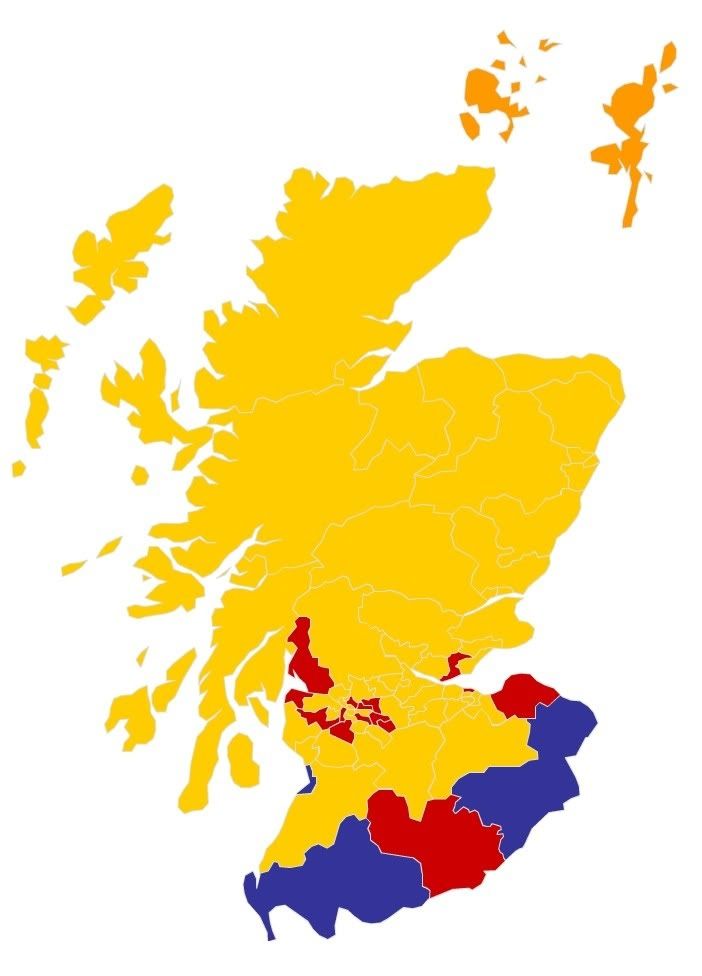
But one thing struck me immediately: the solid block of support for unionist parties in southern Scotland. As I'm sure most people already know, Scotland is split into two ITV franchise areas. STV, an amalgamation of what used to be Scottish TV and Grampian TV, serves most of Scotland, but the southern part is in a franchise area served by Border TV which includes a large chunk of England.
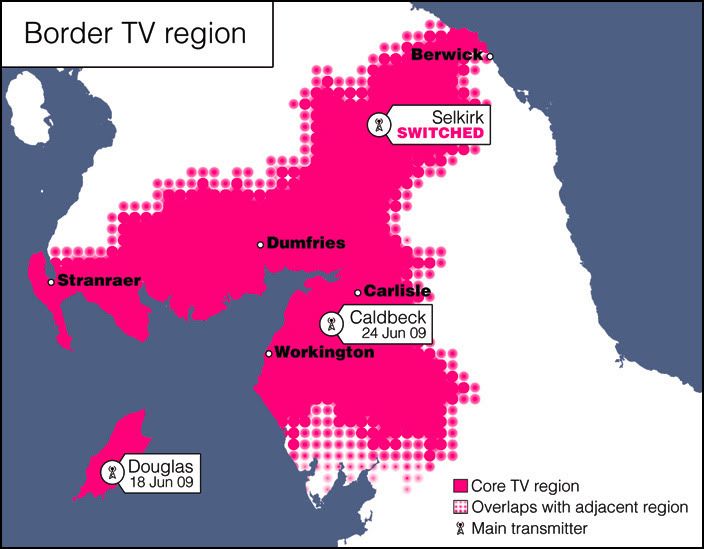
As we can see, the voting pattern almost exactly reflects the franchise boundary. To me, this suggests that the broadcast media play an enormous role in determining the political agenda of the areas they serve. STV serves only Scotland, and therefore is able to focus more on Scottish issues than UK issues. But Border TV, because it serves parts of both England and Scotland, is of necessity going to have a different focus, centred more on UK issues than Scottish issues.
If we're looking for reasons to explain why the political agenda in Scotland is more focused on Scotland than is the case in Wales, this is probably one of the them. For how many parts of eastern Wales get their regional TV from England?
If we want our next general election in Wales to be fought on Welsh issues rather than the UK issues that this one has been fought on, one of the keys will be to ensure that all parts of Wales are served by broadcast media that can focus properly on Welsh issues.
If Plaid had won 14 seats, everyone in Plaid would have been hugely relieved and we would be hailing it as a real achievement. But for the sake of just a few votes in a few key places we ended up with 11, and it's called a disaster.
It isn't. It's a disappointment.
And for those who say that something has now got to change, I would say it's just too easy to blame Ieuan Wyn Jones for not being as charismatic a leader as Alex Salmond. It might be part of our problem, but it wasn't the root cause of our problem.
As I see it, we put all our effort as a party into securing the referendum on primary lawmaking powers ... and then, of course, winning it. That was a huge achievement, and it is almost entirely down to us as a party and, if I can say so, to Ieuan's leadership. No-one else in Plaid could have held Labour's hand and led them to accept it. Similarly no-one else could have got Labour to see that Wales was being unfairly treated in financial terms by the Labour government in Westminster before last May, and by the Tories and LibDems in government in Westminster now.
But we were worried about the referendum result. We thought it would be close, and we put our effort into winning the referendum without really thinking what we wanted after we'd won it. We then produced a "shopping list" of all the things we wanted, putting them into our manifesto. What we wanted was all good, but what it lacked was an overarching framework ... a clearly defined road map of where we want to take Wales.
It's not enough to say we want a "better Wales", for who doesn't want that? We have to spell out what that better Wales is. Yes, it will be an independent Wales. We must say that, and say that clearly, no matter whether it puts people off or not.
But independence is a means to an end. We need to show how we, as an independent nation, will be richer than we are now, richer than we ever would be as part of the UK, and richer per head of population than the rest of the UK. We need to show how to use our wealth to create a more equal Wales, a Wales that does not just deal with the symptoms of poverty, but dramatically narrows the gap between rich and poor. We need to show that we have abundant natural resources in our tide and waves, and that the energy we export to the rest of this island and further afield will make us rich.
We need to hammer out a route map that will get us there. And if that involves others from outside Plaid, all the better, for Plaid should not have a monopoly on independence. But hammering this out and making it a primary subject of civil and political debate in Wales (which will be made all the more easy because it will now be the big topic in Scotland too) must be more important than thinking we can do better simply by choosing a new leader.
Having snatched a few hours rest earlier this evening, I and my trusty espresso machine should be able to make it through the night watching the results come in.

Perhaps I'll get egg all over my face if my predictions turn out to be wrong. But never mind, I'll scrape them off and enjoy them lightly poached with a garnish of caviar.
-
I'll also have one eye on the Scottish election, and even though I'm sure it will be mentioned on S4C and BBC Wales, I'll be watching STV's coverage, which will be online here. From past experience it's much less deferential than the BBC's coverage.
The Scottish election has the promise of being much more momentous than ours; for if the SNP and Greens can get a majority, there will be a referendum on Scottish independence within the next four or five years. Whether it is won or lost, the processes leading to it—in particular the legal and constitutional questions that will have to be asked and answered—will go a long way towards setting out a route map for other non-independent countries in the EU to become independent, including Wales.
-
For Wales, whatever the results, I think Labour will continue to lead us on a steady downhill course in terms of economic performance and prosperity relative to the rest of the UK. If we don't vote to change anything, why should we expect anything to change? We will only change this when we are ready to take the levers of the Welsh economy into our own hands. But who knows, perhaps we will take one or two steps towards weening ourselves off dependency in this Fourth Assembly ... even if we have to drag Labour to the point where they are no longer terrified of us taking responsibility for ourselves.
Today's the big day. Get out and vote to make Wales a better place.
We each have two votes. On the regional ballot paper, which will only have the party names rather than the names of the candidates standing, Always Vote Plaid.
On the constituency ballot paper, which will have the name of the candidate as well as the party s/he is standing for, vote for the Plaid Cymru candidate unless you live in Montgomery, Cardiff North or Cardiff Central. In these three seats we need to hold our noses and vote tactically in order to make it more likely that Plaid will win one of the regional seats:
• Montgomery ... vote for Russell George, Conservative
• Cardiff North ... vote for Jonathan Morgan, Conservative
• Cardiff Central ... vote for Nigel Howells, Liberal Democrat
But everywhere else in Wales the answer is simple: Vote Plaid Twice.
The biggest laugh of today must be from Paul Murphy's endorsement of Carwyn Jones here on WalesHome. The classic piece of spin was:
In an age where hyperactivity is often mistaken for effective leadership ...
In other words, it might look as if he's asleep, and he probably is asleep ... but we have no choice but to call it a good thing.
And indeed it is, for just think of the damage he could inflict on Wales if he had more energy and determination. As one of Labour's most prominent dinosaurs, Paul Murphy knows every bit as much as one of the others what it's like for a faster and cleverer Plaid Cymru to run rings around an all "too dull" Labour Party.
Long may it continue.
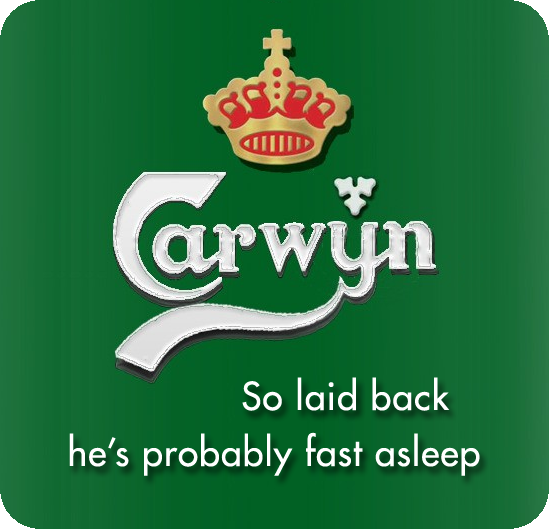
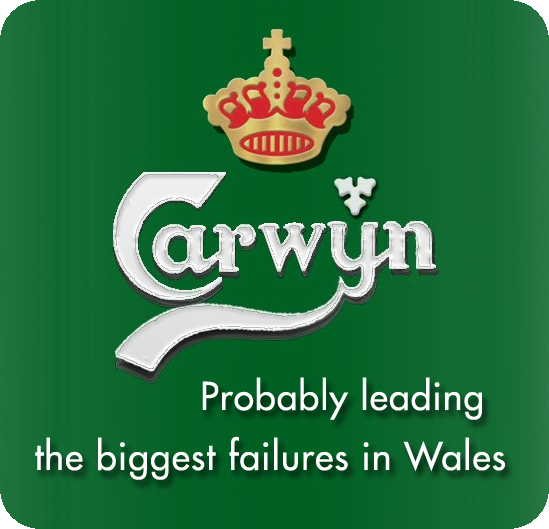
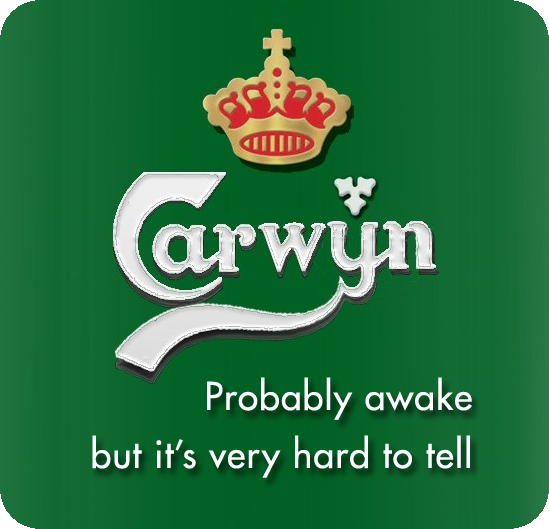
Never particularly fast on his feet, we don't call him Cobweb Jones for nothing.
I've now completed a series of analyses for the five electoral regions of Wales, which people can read by clicking these links:
South Wales West
South Wales Central
South Wales East
North Wales
Mid and West Wales
Now the time has come to put it all together and predict what the overall picture will be. I firmly believe that in order to make proper sense of the election—and of course the result—we cannot consider constituency results in isolation from the regions that those constituencies are in. Very often, winning in a particular constituency will result in losing a list seat, and vice versa.
South Wales West
Labour ... 7
Conservative ... 2
Plaid Cymru ... 2South Wales Central
Labour ... 6
South Wales East
Conservative ... 2
Plaid Cymru ... 2
Liberal Democrat ... 1
Green ... 1Labour ... 6
North Wales
Conservative ... 2
Plaid Cymru ... 2
Liberal Democrat ... 1
UKIP ... 1Labour ... 6
Mid and West Wales
Plaid Cymru ... 4
Conservative ... 3Plaid Cymru ... 4
Wales as a Whole
Labour ... 4
Conservative ... 3
Liberal Democrat ... 1Labour ... 29
Plaid Cymru ... 14
Conservative ... 12
Liberal Democrat ... 3
Green ... 1
UKIP ... 1
The question to ask is whether this is reasonable. I don't think that anyone will be particularly surprised at Labour getting 29 seats. This seems to be in line with a good many forecasts which show Labour increasing their number of seats but failing to get a majority.
However, when it come to Plaid Cymru, I have to say that 14 seats is more than my gut feeling would say is right; and my gut also tells me that the Conservatives should do better. If the figures had worked out at 14 for the Tories and 12 for Plaid Cymru, it would be in line with what most people are forecasting and made my gut feel more comfortable.
So I've given it some thought, yet have to stick with the sum of my five regional analyses. For the Tories, the key factor is that they might well get a few percentage points more than in 2007, and they might even win seats that they don't hold. But because they are not dominant in any part of Wales, what they gain in constituencies tends to be cancelled out in the regional list; and similarly, anything they lose at constituency level can be made up in the regional list.
In arriving at my 12 seat prediction for the Tories, I have included them gaining new seats in Aberconwy and Montgomery, and said they will hold the key marginal seat of Cardiff North. Yet this still only leaves them with 12 seats. I can't see where a thirteenth seat could come from.
-
For Plaid Cymru, I have tried not to indulge in wishful thinking, and perhaps over-compensated for that by saying that we will lose Aberconwy. Yet I can see how Plaid might not get 14 seats, because in a number of cases Plaid are picking up the fourth list seat in a region at the expense of smaller parties. So for example, we might lose one regional seat in South Wales West if the LibDems get more than half our share of the vote; or we might lose a seat in South Wales Central if the Tories fail to hold Cardiff North; or we might lose a seat in North Wales if the LibDems or UKIP do better than I expect them to. So yes, Plaid could go down to about 11 seats, but I'll stick to my prediction of 14.
-
I don't think my prediction of the LibDems losing seats will come as much of a surprise to anybody. The question has always been just how low they could go, and my prediction of 3 seats is definitely in the lower range of expectations. I am predicting that they will hold Cardiff Central, but the three key issues will be whether they can hold Montgomery and whether they can get enough of the regional vote in South Wales West and North Wales to win a regional seat. They can get more seats than I've predicted, but I think it's unlikely.
-
In predicting that the Greens will win a seat, I might well accuse myself of wishful thinking because I certainly want them to win a seat. But whether they win one in South Wales Central actually depends far less on their share of the vote than on whether the LibDems hold Cardiff Central and the Tories hold Cardiff North. This is one region where tactical voting will be crucial.
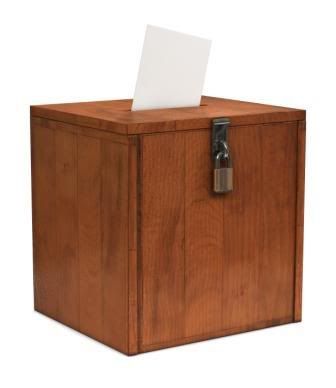
So who will form the next Welsh Government?
In a sense, UKIP are the wildcard in any calculation. I've predicted they will win one seat, and they could possibly win another in North Wales. This might well make some in Labour think twice about whether they can form a minority government, for although a "rainbow coalition" of Plaid, the Tories and the LibDems might be remotely possible (or indeed a "super rainbow" that includes the Green AM) it is completely out of the question for it to include UKIP.
Labour will of course toy with the idea of doing a deal with either the Greens or the LibDems. Unfortunately for them, Jake Griffiths is highly unlikely to support them if they support nuclear power. And Labour do now say they support nuclear power, and claim that what it says in their manifesto for this election is worthless, because what it says in their 2010 manifesto for Westminster must take precedence over it. John Dixon beat me to saying what I thought of that here.
-
As for a deal with the LibDems, two factors come into play. The Labour leaders in Westminster might put pressure on Carwyn Jones to do a deal with the LibDems in order to demonstrate to LibDems in Westminster that there is an alternative to them being in coalition with the Tories. The primarily ambition of Labour is to be in power in Westminster and, as we have seen, Labour have played this election in Wales almost entirely in reaction to what the Tories and LibDems are doing in coalition in Westminster rather than on Welsh issues.
On the other hand, as one of my friends told me last night, Labour might well regard this as an opportunity to kill off the LibDems for good. If Labour give credibility to the LibDems by including them in government, they will be giving them a lifeline by which they can rebuild themselves in Wales. Why would Labour want to do that, especially because a good part of their surge in support in the polls has come from angry and disaffected LibDems turning to Labour?
-
So that leaves One Wales 2 as the only option to ensure a stable programme of government for the next five years. When the results come out on Friday, a lot of us will be asking if anything has really changed. Labour will have three more seats, the LibDems will have three less, and Plaid and the Tories will be where they were before the election. A lot of the faces will have changed, but the numbers won't have changed much at all.
On the principle of leaving the best until last, my final analysis is for the Mid and West Wales region.
This was the result in 2007:
Mid and West Wales
Constituencies
1 Brecon & Radnor
2 Carmarthen East & Dinefwr
3 Carmarthen West & SP
4 Ceredigion
5 Dwyfor Meirionnydd
6 Llanelli
7 Montgomery
8 Preseli Pembrokeshire
Regional seats
1 Labour
2 Labour
3 Conservative
4 Plaid Cymru
This was the only region in Wales where Labour failed to win a constituency seat. However they did get 18.4% of the regional vote which entitled them to two regional seats. They were very close to winning a third, but Plaid Cymru just beat them to it.
The Constituency Vote
It's probably easiest to start with the LibDems. They won two seats—Brecon and Radnor, and Montgomery—and got a creditable 36.1% in Ceredigion, coming second to Plaid.
I think they are likely to hold Brecon and Radnor not least because of Kirsty Williams, who has proved to be a relatively good leader of her party. She's feisty, and she can sometimes lay a verbal glove on minsters in the Labour-Plaid One Wales government ... although maybe only one time in ten. If that is what an opposition leader is for, she probably makes a better job of it than the Tories. I'm not sure that her party has anything very positive to offer as an alternative, though.
What will see her through is that her margin of victory last time was 52.3% to the Tories' 33.5% ... with both Labour and Plaid down in single figures. This margin is simply too big to be eroded away completely, especially because the only party that has a chance of taking the seat from her is the Tories. No LibDem—no matter how angry they might be about what their party is doing in Westminster—will switch to the Tories because of it.
-
Things are slightly different in Montgomery. Although this seat was won by Mick Bates by a margin of 39.0% to 30.2% over the Tories, he was obliged to leave the LibDems as a result of his conviction for assault and some commentators might consider this to be an independent rather than a LibDem seat as a result.
The LibDems lost this seat at Westminster level in May last year, but there were some unusual factors. We had the strange and rather ridiculous antics of Lembit Öpik, who made the mistake of thinking that any personal publicity, no matter how inappropriate, was a way of promoting politics. And he was up against the popular Glyn Davies who, because of his conversion to devolution and clearly expressed commitment to a Senedd with primary lawmaking powers, is someone I would call a decent Tory.
This result will be crucial to the overall distribution of seats in this region and the Assembly as a whole. It is highly unlikely that the LibDems will get 13% of the regional vote, and as such they would only be entitled to one of the twelve seats on a proportional basis. If the LibDems lose Montgomery, they will not get a regional seat to make up for it. If they win, they will effectively take away a regional seat from one of the other parties. Because of this, people who do not support the LibDems need to vote tactically. It will be close, but the bookies are showing Russell George, the Tory candidate, slightly ahead.
Of course voting for a Tory is something most people in Wales would only do after a full frontal lobotomy. So I need to explain that the Tories will not gain anything in overall terms if they win this seat. They will simply get one less regional seat and end up with the same number as they would get based on their share of the regional vote. I'll explain how it works in more detail later in this post.
-
In Ceredigion the LibDems might feel they have a chance, largely because Mark Williams held the seat comfortably in 2010, by a margin that came as a shock to most people in Plaid. But there are factors that would explain this, and the most important of these is incumbency.
As a particular type of MP, Mark Williams is second to none. He makes himself known all over the constituency, picking up every complaint and promising to deal with it. He faithfully writes the letters or asks the questions, then reports back able to say that he did his best for them. Of course nothing he says or does could actually have made one scrap of difference, because the LibDems did not have the power to change anything. Nor could he ever be criticized for voting one way or the other, because whichever way he voted would make no difference to the result. That is the luxury of being neither in the government nor in the opposition. But who has ever heard of Elizabeth Evans?
The incumbency factor also works for Plaid Cymru's Elin Jones, but in a different way. She is a minister in the One Wales government, and probably the only AM that could successfully deliver on agriculture and rural affairs ... simply because nobody in Labour has got the first clue about it. She has done that job particularly well. I actually think the biggest danger in Ceredigion comes from Plaid not being forthright on its policies, particularly with regard to green issues. Our failure to explicitly state in our manifesto that we are against nuclear power is likely to cost us votes from those who do care passionately about the environment. The LibDems have done this, and this might sway a good number of voters to them.
It is a ridiculous situation for Plaid to find itself in because our opposition to nuclear would come across clearly if it were not for Ieuan Wyn Jones. He seems to have calculated that he stands more chance of winning votes in Ynys Môn by supporting nuclear power there, but opposing it everywhere else. Even at a pragmatic level he is being much too defensive, for his seat is safer than he thinks and much safer than Ceredigion. The margin in Ynys Môn is 22.3%, in Ceredigion it is 13.1%. But on the level of principle, I would go so far as to say that his equivocation on matters like this might well be primarily responsible for our lack-lustre showing in the opinion polls. A leader at odds with his party will constantly be forced onto the back foot. We need to be sending clear messages rather than mixed messages.
Even so, I don't think this will be enough to see Elin lose her seat. But it will make it much closer than it otherwise would be, and will also have a generally negative effect elsewhere in Wales that could make all the difference between Plaid winning and losing regional seats.
-
Dwyfor Meirionnydd and Carmarthern East and Dinefor are and will remain rock solid Plaid seats. The fourth constituency Plaid hold is Llanelli. Helen Mary Jones won this with 50.1% of the vote, comfortably ahead of Labour with 36.1%. That's a large margin and the seat should be safe for Plaid, even though it will be a lot tighter than before. However even if Plaid were to lose the seat, it would probably make no difference to the overall result because we would gain a regional seat to make up for it, and Labour would simply win one regional seat less. Again, I'll explain how that works in more detail later.
-
This leaves two other constituencies currently held by the Tories. In 2007 the Tories won Preseli Pembrokeshire with 38.6% of the vote, with Labour and Plaid not too far behind on 27.4% and 24.7% of the vote respectively. This time round, it should be a battle between the Tories and Labour. Will the Tory vote hold up, or will the general surge to Labour overtake it? The bookies favour Labour and I'd probably go along with that, but I do have a suspicion that the Tories might hold on. Yet whichever way it goes won't make any difference to the overall number of seats each party will win.
In 2007 Carmarthen West and South Pembrokeshire was a very tight contest in which fewer than 300 votes separated the three main parties. The Tories won it with 30.1% of the vote, with Labour on 29.7% and Plaid on 29.2%. In better times, this is a seat that Plaid should expect to win if we ever hope to make a breakthrough in Welsh politics; and I'm sure it was for this reason that Nerys Evans chose to fight this seat now rather than stay on the regional list. Although it must be said that Plaid would have very little hope of winning a list seat if it won five constituency seats, so in that respect she made the right choice.
But it doesn't look like she will win. If Llanelli is going to be tight when Plaid are defending a margin of 14%, I don't think there is any realistic chance of Plaid overtaking Labour in Carmathen West, despite all of Nerys' qualities. This seat will be a battle between Labour and the Tories. I think Labour will win but, in just the same way as in Presceli, the outcome won't make any difference to the overall number of seats either Labour or the Tories will win in the region.
So let's now look at the regional vote to see why.

The Regional Vote
These are the details of the regional vote in 2007. Seats are determined by the percentage of the vote on the second ballot paper, but seats already won at constituency level are taken into account. After a seat has been won, the percentage necessary to win another seat is the original percentage divided by two, then three, then four, etc.
Plaid Cymru ... 31.0%
Conservative ... 22.9%
Labour ... 18.4%
LibDem ... 13.3%Round 1 ... Plaid Cymru 31.0% ... already won
Round 2 ... Conservative 22.9% ... already won
Round 3 ... Labour 18.4% ... regional seat 1
Round 4 ... Plaid Cymru 15.5% ... already won
Round 5 ... LibDem 13.3% ... already won
Round 6 ... Conservative 11.5% ... already won
Round 7 ... Plaid Cymru 10.3% ... already won
Round 8 ... Labour 9.2% ... regional seat 2
Round 9 ... Plaid Cymru 7.8% ... already won
Round 10 ... Conservative 7.6% ... regional seat 3
Round 11 ... LibDem 6.7% ... already won
Round 12 ... Plaid Cymru 6.2% ... regional seat 4
This time round, the two things we can say with relative certainty are that Labour will increase their share of the vote and will probably come top; and that the LibDems will lose votes. I reckon Plaid will still beat the Tories. As it happens, this is also what the latest YouGov poll suggests. So I'm content to use their figures to project the likely result even though I think YouGov's polling methods tend to over-estimate Labour's share of the vote:
Labour ... 29.0%
Plaid Cymru ... 27.0%
Conservative ... 25.0%
LibDem ... 8.0%Round 1 ... Labour 29.0%
Round 2 ... Plaid Cymru 27.0%
Round 3 ... Conservative 25.0%
Round 4 ... Labour 14.5%
Round 5 ... Plaid Cymru 13.5%
Round 6 ... Conservative 12.5%
Round 7 ... Labour 9.7%
Round 8 ... Plaid Cymru 9.0%
Round 9 ... Conservative 8.3%
Round 10 ... LibDem 8.0%
Round 11 ... Labour 7.3%
Round 12 ... Plaid Cymru 6.8%
The first thing to note is that it will be impossible for the LibDems to win more than one seat in this region on a proportional basis. Even if they managed to get 13% of the regional vote—which is highly unlikely with the polls showing them at only 8%—they would still only get one seat.
But the additional member electoral system has an inbuilt bias towards constituencies, because these are taken into account first. So if the LibDems win both Brecon and Radnor and Montgomery, they will end up with one more seat than they would otherwise be entitled to, and this will effectively take away a regional seat from one of the other parties. That's why it's important for supporters of other parties to vote tactically for the Tory candidate if they live in Montgomery, but then use their regional vote for their first choice party.
If the LibDems win two seats at constituency level, it means only ten seats are available for the other parties. But if we can hold them to one, it means that eleven seats are available.
-
None of the three main parties is likely to win more constituency seats than they would be entitled to based on the regional vote. So it is the regional vote that will determine the overall number of seats they win, irrespective of the results in any individual constituency. Because of this, voting tactically for the Tory candidate if you live in Montgomery will not give an overall advantage to the Tories ... for they will still win the three seats they are entitled to from their share of the list vote, and are very unlikely to win a fourth seat.
The Tories will get three seats and only three seats. Even in the all but impossible event of them holding Preseli and Carmarthen West, and winning Montgomery from the LibDems, they will still get three seats overall. But it is much more likely that they will win just one constituency, but then get two of the regional seats.
Labour look likely to get four seats overall. As I've said, I think they will win both Carmarthen West and Presceli, but not win Llanelli. If I'm right, that will mean that they win two constituency and two list seats. But if I'm wrong and they do win Llanelli, they'll simply get one less regional seat, making no difference to the overall result.
Finally for Plaid, we will definitely win Dwyfor Meirionydd, Carmarthen East and Ceredigion, and I think we'll just hold on in Llanelli. But even if we lose Llanelli, we will probably get the fourth regional seat anyway ... providing we get more regional votes than the Tories and more than four times the vote of any of the minor parties. Either the Greens or UKIP would need to get somewhere around 7% to take it from us.

The Prediction
The overall result hinges on two key constituency battles: whether the Tories can win Montgomery from the LibDems and, although to a much lesser extent, whether Plaid hold Llanelli. Both will be tight, but this is how I think things will work out:
• Labour will win both Preseli Pembrokeshire and Carmarthen West and South Pembrokeshire from the Tories, but will fail to take Llanelli from Plaid. They will win two regional seats if they lose Llanelli, but only one if they were to win it. Either way, Labour will get four seats in total.
• Plaid Cymru will hold each of the constituencies they won in 2007: Dwyfor Meirionnydd, Carmarthen East and Dinefwr, Ceredigion and Llanelli. But if Plaid were to lose Llanelli we would win a regional seat instead. Either way, Plaid will get four seats in total.
• The Tories will win Montgomeryshire from the LibDems, but will lose the two constituencies they currently hold. They will win two regional seats, giving them three seats in total.
• The LibDems will hold Brecon and Radnorshire but lose Montgomeryshire to the Tories. They will not win a regional seat, leaving them with only one seat in total.
Much of what will appear on this blog will also appear in the Syniadau Forums, but the emphasis on this blog is slightly different. The forums are focused more on the structures and institutions that Wales will need to develop in order to become a successful independent nation, arranged on a subject by subject basis, but the blog will have more of an emphasis on day to day political news and developments.
People are welcome to reply or leave comments either here or on the Syniadau Forums. If anyone wants to initiate a new subject they are very welcome to do so there.
![]()
![]()
![]()